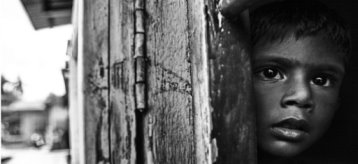Heavy fighting has broken out between pro-government and opposition supporters in Lebanon's central mountains overlooking the capital, Beirut. (Source:Al Jazeera) Who's who in Lebanese politics
The clashes in Tripoli came after the opposition began pulling its fighters off the streets of Beirut [AFP]
The three highest offices in government are reserved for Shia Muslim, Sunni Muslim and Maronite Christian politicians.
The ties that bind the disparate factions have led to the development of distinct majority and opposition blocs.
Some of the major players in Lebanese politics are:
Hassan Nasrallah is secretary-general of Hezbollah, a Shia political party and resistance movement.
 |
| Hassan Nasrallah [EPA] |
Nasrallah joined Hezbollah in 1982 after spending several years as a member of Amal. He became Hezbollah's secretary-general in 1992.
He guided the organisation through a concerted period of political accommodation with other parties in
Under his leadership, Hezbollah also increased its attacks against Israeli occupying forces.
After the war, Nasrallah led calls for a Lebanese national unity government to be formed. He has criticised what he calls Western interference in Lebanese affairs. Hezbollah is backed by
The group has criticised the UN's formation of an international tribunal to investigate the assassination of Rafiq al-Hariri, a former Lebanese prime minister.
The last UN report on the investigations have blamed
Saad al-Hariri is leader of the Future Movement (al-Mustaqbal), a Sunni Muslim party.
 |
| Saad al-Hariri [AFP] |
The Future Movement is the largest party within the March 14 Forces,
Al-Hariri became Future's leader in 2005 after his father, Rafiq, was assassinated.
The Future Movement later formed allegiances with other parties, including the Druze Progressive Socialist Party and the Christian Lebanese Forces.
The new March 14 Forces alliance ran on an anti-Syria platform in 2005's parliamentary elections, calling on
Saad al-Hariri was tipped to become
He declined the post, recommending the selection of Fouad Siniora, an economist and finance minister during the prime ministerial terms of Rafiq al-Hariri.
Al-Hariri is in favour of disarming Hezbollah's Islamic Resistance wing. He is backed by the
Fouad Siniora is the Lebanese prime minister and a member of Saad Hariri's Future party (al-Mustaqbal).
 |
| Fouad Siniora [EPA] |
He has served twice as
Siniora became prime minister in 2005, when the March 14 Forces took a parliamentary majority.
Several months after the war between Hezbollah and
The opposition has argued that Siniora has failed to deliver assistance to areas of
Siniora's cabinet has been effectively impotent since the Hezbollah-led opposition pulled its members from the cabinet in November 2006. However, his government receives support from the
Walid Jumblatt, a Druze, leads the Progressive Socialist Party (PSP), part of the majority March 14 Forces bloc.
 |
| Walid Jumblatt [EPA] |
In 1982 and 1983, as
After his fighters defeated the Maronites, Jumblatt solidified his position as de facto leader of the Druze community.
He is famous for shifting his political allegiances in order to protect the long-term interests of the Druze.
Jumblatt supported
He has maintained good relations with international politicians and commands significant respect across
Michel Suleiman is the chief commander of the Lebanese Armed Forces (LAF), who succeeded Emile Lahoud when the latter was elected president of
 |
| Michel Suleiman [EPA] |
The head of the Lebanese army since 1998, Suleiman is seen as a unifying figure in
The 59-year-old Maronite Christian was once seen as a supporter of
His profile as a strong Lebanese leader was boosted after the Lebanese army cleared the Nahr al-Bared Palestinian refugee camp of al-Qaeda-inspired Fatah al-Islam fighters after a 15-week siege in May 2007.
He also gained support after refusing to deploy the military to crack down on massive anti-Syria street demonstrations in March 2005, days after the assassination of Rafiq al-Hariri, the former prime minister.
Suleiman is the consensus candidate for
Michel Aoun, a Maronite Christian, leads the Free Patriotic Movement (FPM), a Christian political organisation which advocates a secular character for
 |
| General Michel Aoun [EPA] |
A former commander-in-chief of the Lebanese army, Aoun was also prime minister and acting president of the predominantly Christian military government in east
His rule ended when he was forced from the presidential palace at Baabda by Syrian troops.
Aoun fiercely criticised Syrian influence in
He returned to
The FPM is part of the Hezbollah-led opposition to the majority March 14 Forces parliamentary bloc.
Nabih Berri holds the position of house speaker in Lebanon's national assembly, and is leader of Amal, a Shia Muslim party.
 |
| Nabih Berri [EPA] |
Berri took full control of Amal in 1980 and led the organisation for the remainder of
Amal was particularly involved in battles for control of Muslim west
At the height of the war, Amal fought Hezbollah, a rival Shia movement.
Berri's group currently has cordial relations with Hezbollah, and supported it in its July-August 2006 war with
Berri currently dismisses the rump Lebanese cabinet as unconstitutional and unrepresentative.
His criticism comes after ministers opposed to the March 14 parliamentary majority pulled out of the Lebanese cabinet in November 2006, in protest at the failure to form a unity cabinet.
Samir Geagea is head of the Lebanese Force, a predominantly Maronite Christian political party and former militia group.
 |
| Samir Geagea [EPA] |
Geagea became an active member of the right-wing Phalangist Party, which became the main Christian fighting force upon the outbreak of the civil war in 1975.
In the early 1980s, he was appointed as the head of the Lebanese Forces militia northern front.
He led the group in fighting against the Syrian army, Walid Jumblatt's PSP and Palestinian fighters.
Geagea spoke out against Syrian influence in
He was jailed for life in 1994 in connection to assassinations carried out during the civil war but after the 2005 elections an amnesty bill was passed and Geagea was freed.
Geagea says he was a political prisoner and was convicted because of his opposition to












2 σχόλια:
ενημερωτικό!!
Καλησπερίζω, φίλε μου!
Απο σήμερα μπορώ να κάθομαι στον Η/Υ-αλλά για λίγο μοναχά.
Έκανα εγχείρηση σκωλικομπλαμπλα και δεν το πάλευα καθόλου να σηκωθώ από το κρεβάτι.
Σε μερικές μέρες όμως, θα είμαι περδίκι και θα σας έχω νεώτερα!
Δημοσίευση σχολίου